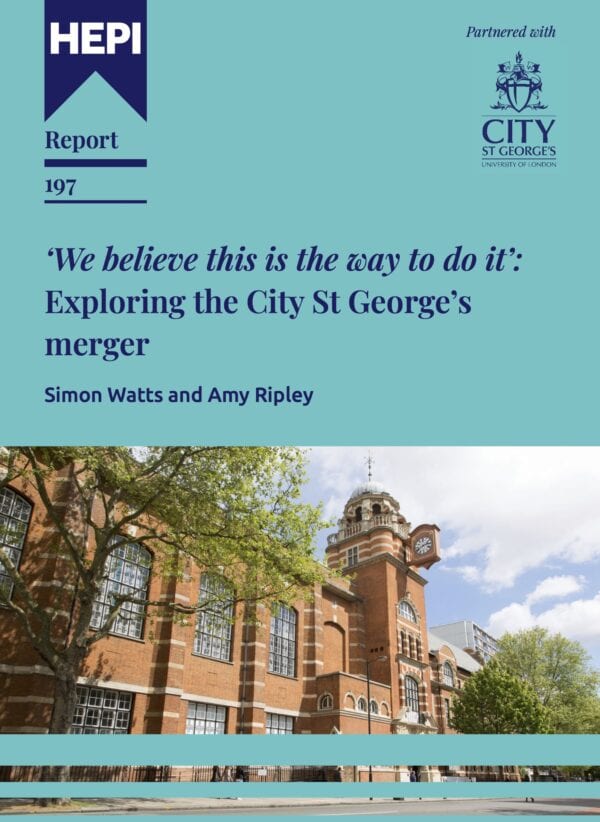WEEKEND READING: Should the seminal Robbins report inform the forthcoming post-16 strategy?
HEPI’s Director, Nick Hillman, spent Friday at a conference organised by SKOPE (the Centre for Skills, Knowledge, and Organisational Performance), part of the University of Oxford’s Department of Education. It was overseen by James Robson, Professor of Tertiary Education Systems, and featured the Minister for Skills, Baroness (Jacqui) Smith, among many others.
In his opening address, Professor Robson articulated the growing consensus that, when it comes to post-school education, the time has come:
- to replace competition with coordination;
- to encourage place-based approaches; and
- to unlock new opportunities for the benefit of students and employers.
In her remarks, Jacqui Smith agreed, arguing for an end to ‘town / gown’ splits. The Minister emphasised she thinks higher education must reach out to other parts of the education sector: while she recognises the majority of future skills needs will be at a higher level, she wants to bring down the ‘artificial’ barriers between FE and HE in a ‘coordinated’ and ‘facilitated’ way.
Some people in the audience interpreted this as meaning universities’ only hope of more money is to do the Government’s bidding and, either way, the higher education sector clearly needs to get ready for a more directive approach from a more active state. The basic idea seems to be to have everyone work together to raise productivity, level up the regions outside London and deliver more social mobility.
It may sound lovely but these issues are as old as houses and, whenever I think of them, I think of those paragraphs from the Robbins committee – which was designed ‘to review the pattern of full-time higher education’ – that wrestle with freedom versus direction.
The Robbins report struggled with the right level of co-ordination and, while much of what it said reflected Lionel Robbins’s liberal views, it also envisaged a role for oversight and direction:
Will it be possible to secure the advantages of co-ordination while preserving the advantages of liberty? The question is of critical importance. Freedom of institutions as well as individual freedom is an essential constituent of a free society and the tradition of academic freedom in this country has deep roots in the whole history of our people. We are convinced also that such freedom is a necessary condition of the highest efficiency and the proper progress of academic institutions, and that encroachments upon their liberty, in the supposed interests of greater efficiency, would in fact diminish their efficiency and stultify their development. …
We believe that a system that aims at the maximum of independence compatible with the necessary degree of public control is good in itself, as reflecting the ultimate values of a free society. We believe that a multiplicity of centres of initiative safeguards spontaneity and variety, and therefore provides the surest guarantee of intellectual progress and moral responsibility. We do not regard such freedom as a privilege but rather as a necessary condition for the proper discharge of the higher academic functions as we conceive them. …
The difficulties are greatest when it is a question whether institutions of higher education should have the ultimate right to determine their own size. … if funds are available, refusal to co-operate in national policies or to meet national emergencies is an unsympathetic attitude, and it would be easy to think of reasons why it should be overruled. … If, when all the reasons for change have been explained, the institution still prefers not to co-operate it is better that it should be allowed to follow its own path. This being so, it must not complain if various benefits going to co-operating institutions do not come its way. … [My emphasis]
it is unlikely that separate consideration by independent institutions of their own affairs in their own circumstances will always result in a pattern that is comprehensive and appropriate in relation to the needs of society and the demands of the national economy. There is no guarantee of the emergence of any coherent policy. And this being so, it is not reasonable to expect that the Government, which is the source of finance, should be content with an absence of co-ordination or should be without influence thereon. …
It all goes to show, yet again, that there is no such thing as a new education policy question.
There are a number of tests we should perhaps apply to the let’s-coordinate-everything-to-elevate-skills approach that is likely to form the core of the forthcoming post-16 strategy / white paper that is due ‘soon’ – very soon if some of those attending the conference are to be believed and not at all soon if others there are to be believed.
First, if we can’t even build a high-speed speed trainline on budget and on time, why are we so confident we can easily build an integrated skills and education system (and without a material increase in spending)? It is surely right to at least ask whether public authorities really do know so much about the future economy’s needs that individuals should cede control over who should study what and where. Clearly, Skills England could be important here, but it is an untested beast. (I note in passing that the Smiths, Jacqui and Phil [Chair of Skills England], are getting back together to do a webinar this week.)
Secondly, the broken model that tends to be held up in contrast to the coming smooth one is a market in which there is lots of wasteful competition, excessive homogeneity and a lack of focus on the country’s needs. But the idea that the only alternative to a coordinated system is a pure and chaotic market is bunkum. We’ve not had a pure market in higher education and I’ve never met anyone who wants one. Neither the political centre nor the Far-byn (or is it Cor-age?) axis want one. Perhaps we are letting ourselves be blinded by the idea that there are only two options: a pure red-in-tooth-and-claw market, which is a caricature of what we have, and a cuddly coordinated system, which will be harder to deliver than we pretend.
Thirdly, where is the space for education for education’s sake? As one member of the audience pointed out at the SKOPE conference, current discussions are so focused on ‘skills’ and the economy that education is sometimes becoming lost. Yet FE and HE collaboration is difficult at a practical and day-to-day level. Kath Mitchell, the Vice-Chancellor of Derby University, pointed out the challenges of running an FE college and a university together – for example pointing out that Buxton and Leek College is (absurdly) barred from receiving FE capital funding because it counts as part of the University of Derby.
Fourthly, we should question the assumption underlying current critiques that our universities are much too homogeneous. They do have some things in common, though one might just as well point out that all education institutions that share a legally-protected title controlled by strict criteria, such as ‘university’, are always going to have some things in common. But I’ve visited pretty much every UK university, and many of them multiple times, and I would urge anyone who thinks they’re all the same to do something similar. Just compare the two universities I know best (as I’m on their boards), Manchester and Buckingham: the former is a research-intensive institution with a turnover of £1.4 billion, 12,000 staff and 47,000 students while the other is a teaching-intensive place (‘the home of two-year degrees’) with a turnover of £50 million, 500 staff and 3,500 students as well as the only private medical school in the UK. Or compare the LSE and UCA (the University of the Creative Arts). Or Falmouth University and Newcastle University. These things are not the same.
Finally / fifthly, as Andy Westwood pointed out in his remarks at the SKOPE conference, devolution is ‘non-existent’ in large parts of the country. So what does ‘a coordinated place-based approach’ really mean there? It’s one thing if you’re in Greater Manchester; it’s quite another if you’re in a rural area far from the nearest town or city, college or university. Moreover, while it is true that the old Higher Education Funding Council for England (HEFCE) had a regional aspect to its work which we could well copy today, it was a big funder as well as a regulator so it could incentivise certain behaviours, plus it had a substantial physical regional presence that the Office for Students (intentionally) lacks.







Comments
Ronald Barnett says:
It is surely time to change the phrase ‘higher education’ to ‘higher skills’. Not once in the last 20? 30? years have I heard a politician or read a government paper talk about ‘education’ (let alone ‘culture’, of which Robbins spoke). The talk has been relentlessly of ‘skills’. (The Dearing report unfolded a whole vocabulary around, and a classification of, ‘skills’)
Let us no longer pretend. We no longer have a higher education system. We do have institutions of higher education but that educative capacity is fast dwindling as institutions fall in with the skills ideology.
It is a tyranny, but power lies where it does. Over recent decades, we have witnessed the coming of the end of higher education. It is – a la Laclau – a hegemonic discourse, buttressed by talk of ’employability’, ‘innovation’, ‘learning outcomes’.
It is vital now that the reality be reflected in the talk. A higher skills sector has emerged and we should name it so.
To term this higher skills sector otherwise does no good to anyone. It only credits the state in being interested in education, an interest it long abandoned. And it asks others to connive in an Orwellian-speak, that inverts the real substance of matters. And, in turn, it makes dupes of us all.
Higher education was once associated with the idea and the matter of critical thinking. Let us use what vestiges of critical thinking remain to critique this portrayal of the sector. To retain the phrase ‘higher education sector’ represents a further abandonment of critical thinking.
A higher skills sector is now before us, having been deliberately crafted by the state. Let us name it as such and start facing all the (woeful) implications that flow from this transformation.
Ron Barnett
Reply
Denis Blight says:
This expertly drafted consensus report reads very much like a cleverly written UN resolution that has a major theme complemented by a series of minor themes included to embrace a diversity of views.
Reply
Huw says:
The Robbins report was published on 23rd October 1963 providing a clear articulation of the rationale for the creation and expansion of a number of universities that had already begun. The proposals were linked to plans to grow the economy. Eighteen months later Anthony Crosland gave his Woolwich speech announcing the creation of a polytechnic sector under local government control. The polytechnic proposals were not mentioned in the Robbins report. Contemporary accounts of the reasoning behind the announcement of polytechnic rather than university expansion, most effectively in Peter Mandler’s “The crisis of the meritocracy” outline concern about the cost and focus of universities if they were to expand as outlined in the Robbins without underpinning or consequent economic growth. As Lord Robbins commented thirteen years later in a House of Lords debate, members of the Robbins were told by the Government in power to assume a rate of economic growth of 4 per cent per annum Committee assumed a 4 per cent (Hansard, HL Deb 31 March 1976).
Economic growth in the UK at present is 1% and underlying productivity growth is -0.2%. I’ll repeat that figure for effect minus 0.2%. Of course as Paul Krugman said “productivity isn’t everything but in the long run it’s almost everything.
As Andy Westwood commented yesterday, increases in productivity and economic growth, which were expected to follow the rise in the student tuition fee and removal of the in the cap on student numbers in the 2010s have not materialised. Meanwhile, universities have significantly increased the number of international students, franchised activity and transnational education.
The budget in 2024 and spending review in 2025 have not demonstrably increased university or further education funding, but regions and local authorities are exposed to risk if institutions or their students get into financial difficulties. Witness Dundee and Burnley most recently.
The devolution that seems to be happening in practice is therefore a transfer of risk and responsibilities and not really of significant funding or influence to regional or local bodies. That could change but tinkering with the Adult Skills Fund isn’t really much of a change.
Reply
Gabriel Cavalli says:
I find frustrating the debate between “skills” and “education”. It’s old but I would say, always dated. Of course we have models where we focus on “teaching skills” and models where we focus on “teaching subjects”. At their extremes neither is pedagogically sound, and frankly, don’t work well. Learning doesn’t happen in a vaccuum of suporting knowledge domain or motivation to achieve something. There’s no learning theory that supports this dichotomous view and there’s ample empirical evidence that integration works best (not least in FE contexts, noy just HE). So, if we’re going to have a debate on skills or education, we need to embrace what we ALREADY know about learning, not just what we know about policy. I don’t say this as a targeted critique, but the fact this emerges again and again (as reported above in the SKOPE event or in comments) is deeply frustrating.
Reply
Gavin Moodie says:
Did Robson argue to ‘replace coordination with competition’, or the exact opposite, to replace competition with coordination?
Reply
Nick Hillman says:
Thank you! Now corrected…
Reply
Ros Lucas says:
Co-ordination, collaboration or co-operation without competition might just prove worth trying, especially as far social mobility is concerned.
In the 21st Century, escalating political and global unrest with unequal taxation between mega rich and poor, how can we bring learning for love and life, where employment even with a relevant degree has become difficult to envision, it is time to reconsider the what, where and when ‘education, skills and personal development can best be served.
Home education, forced by lack of the inability of schools to offer a more individual, flexible, employment as well as academic based curriculum, will double the numbers, reduce school sizes from 14+ and contribute to the growing NEETS prrsently at 900,000.
The Edge Foundation’ work perhaps needs more careful consideration as does the lack of real Apprenticeships at all levels and starting points.
The abandonment of VOC ED, pre and Post 16 frrom the curriculum has led to so much wasted talent and ability, as well as innovation and lowering of self esteem among the young unable to prove themselves and achieve success through different methods of self directed learning and ongoing assessment that demonstrates progression, not just retrieval of information…
What worked 200 years ago is indufficient for the technoligical znd digital society and workplace of today – time for radical thinkng to prepare learning institutions for the next 50 years… much more complex than today…
Reply
Gavin Moodie says:
As Winch (2010: 73) pointed out, there are several meanings of ‘skill’ designated by different words in German. First, there is –
‘Fertigheiten, which is roughly equivalent to skills, or even to knacks, which are task-related. . . . Second, there are Fähigheiten, which are abilities which do not necessarily have a typical physical manifestation such as communicating, planning, evaluating. . . . Finally the term is used in the singular, in the vocational context, to denote the overall, integrated capacity of, for example, being a carpenter, priest or doctor. The Fähigheit in this sense is more than a bundle of Fertigheiten and Fähigheiten, for a number of reasons.’
I think Guile and Unwin (2019: 28) would call Fähigheit ‘expertise’, which ’embodies both the practical and theoretical components involved in the performance of work of all kinds’.
I expect many would agree that post-secondary education should develop Fähigheit or expertise in Guile and Unwin’s sense, but I suspect that many advocates for post-secondary education developing skills, including the Oecd (2025), promote Fertigheiten or work tasks.
OECD (2025), Empowering the workforce in the context of a skills-first approach. OECD Skills Studies, OECD Publishing, Paris, https://doi.org/10.1787/345b6528-en.
Winch, Christopher (2010) Dimensions of expertise: A conceptual exploration of vocational knowledge. Continuum.
https://www.google.co.uk/books/edition/Dimensions_of_Expertise/ZfRGAQAAQBAJ?hl=en&gbpv=0
Reply
Add comment